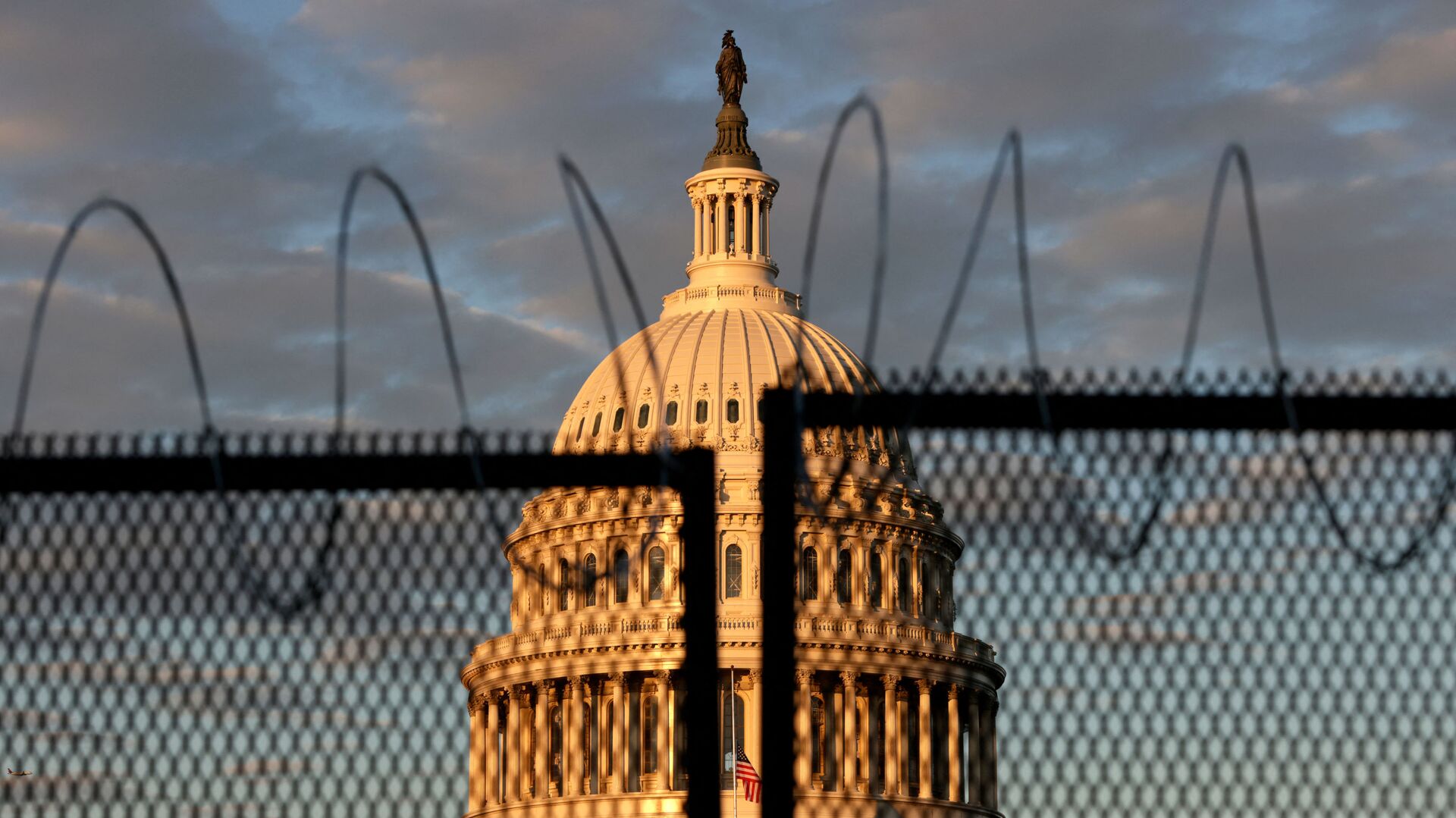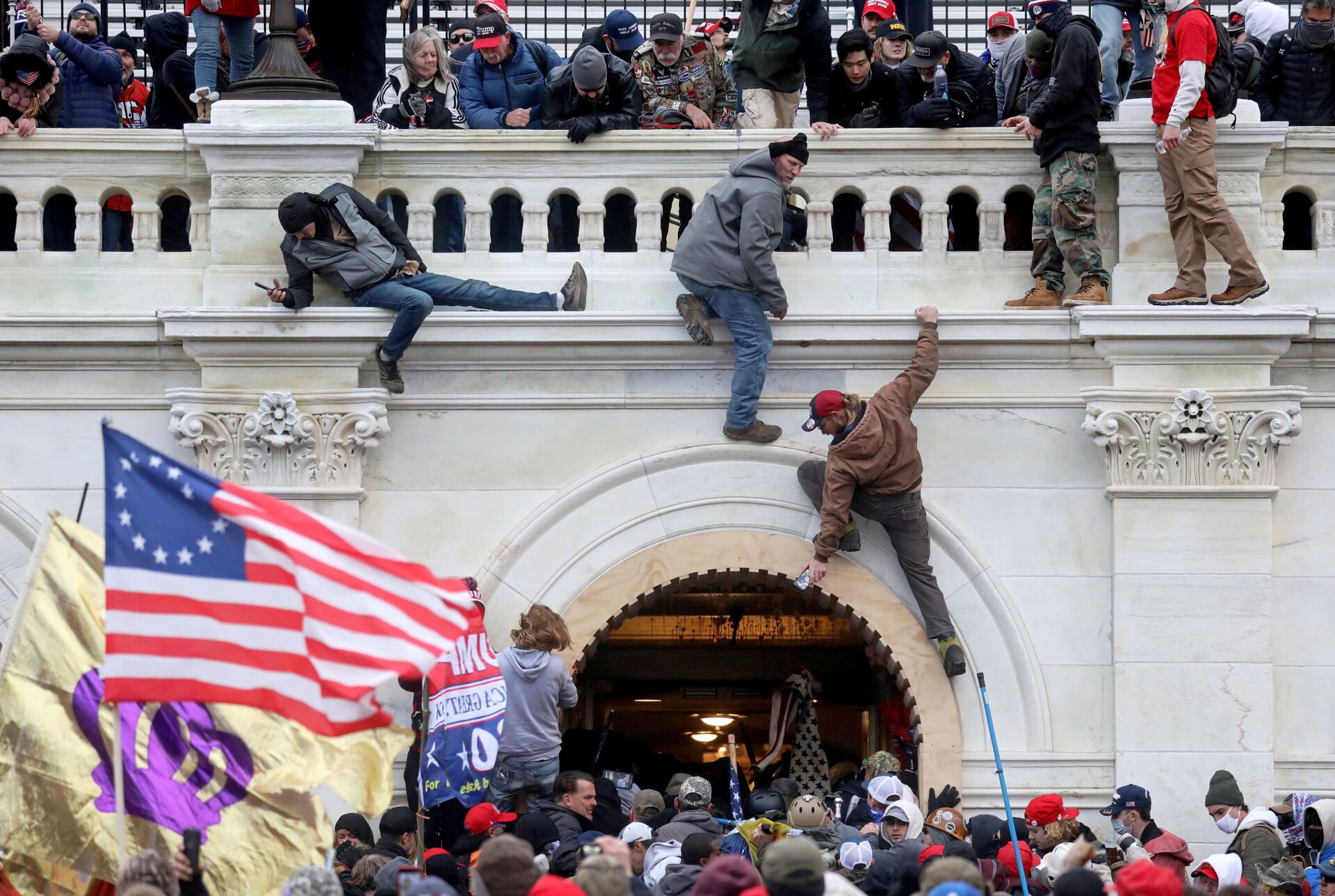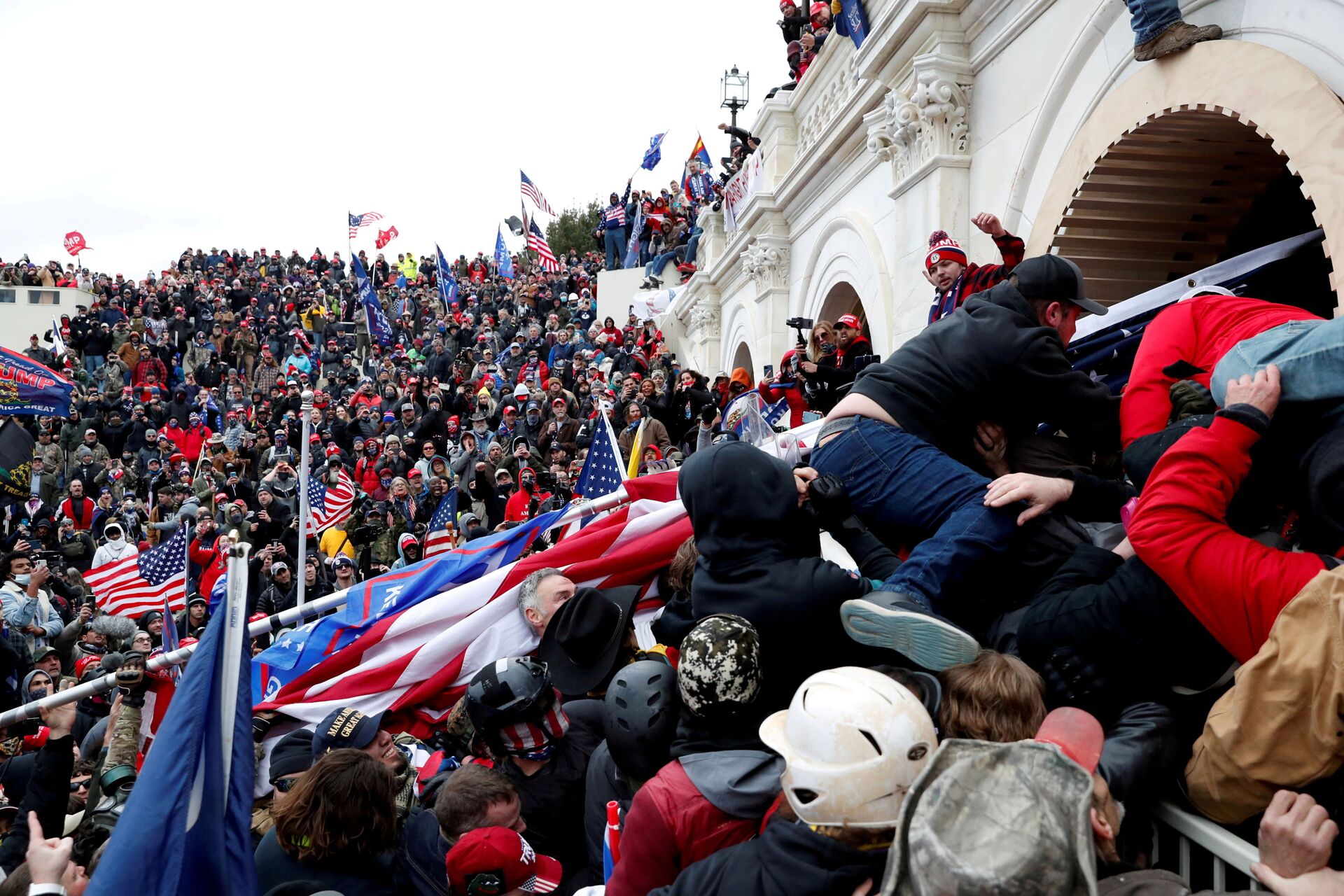Trump Blasts House 6 Jan. Probe as ‘Partisan Sham’ to 'Distract' Americans From Biden's ‘Failures’
07:44 GMT 26.08.2021 (Updated: 07:59 GMT 26.08.2021)

© AFP 2023 / SAMUEL CORUM
Subscribe
The House of Representatives’ Select Committee investigating the 6 January Capitol violence began its first hearing on 27 July in the wake of Republicans lawmakers’ refusal of a bill to create a formal, bipartisan 9/11 Commission-style investigation into the Capitol unrest.
As the Democratic-controlled House committee investigating the January 6 riot at the Capitol is seeking a trove of documents and communications of Donald Trump and officials in his administration related to the attack, the ex-President blasted the probe as a "partisan sham". According to Trump, the committee is being manipulated to "distract Americans" from the "failures" of President Joe Biden and his administration.
"The Leftist 'select committee' has further exposed itself as a partisan sham and waste of taxpayer dollars with a request that's timed to distract Americans from historic and global catastrophes brought on by the failures of Joe Biden and the Democrats," said Trump in his statement, issued through his Save America PAC on Wednesday.
The former president vowed that executive privilege will be defended, “not just on behalf of my Administration and the Patriots who worked beside me, but on behalf of the Office of the President of the United States and the future of our Nation".
Trump added:
"These Democrats only have one tired trick—political theatre—and their latest request only reinforces that pathetic reality."
‘Flurry of Requests’
Trump’s response came as the House select committee, chaired by Rep. Bennie Thompson (D-Miss.), issued a raft of requests to federal agencies and the White House for records related to the events at the Capitol, when Congress met to certify Biden’s win, as well as its run-up.
🚨BREAKING: The Select Committee has issued its first round of demands for records from the Executive Branch.
— January 6th Committee (@January6thCmte) August 25, 2021
Read more here:https://t.co/J4IKBZ6yjE
The sweeping request sought White House records from the National Archives and Records Administration and records from seven other Executive Branch agencies. pic.twitter.com/XcBigbzFDE
— January 6th Committee (@January6thCmte) August 25, 2021
One segment of the request is looking into records “related to the mental stability of Donald Trump or his fitness for office", according to Politico.
The flurry of requests pertains to records “from Election Day to Inauguration Day” on "communications within and among the White House and Executive Branch agencies".

A mob of supporters of U.S. President Donald Trump fight with members of law enforcement at a door they broke open as they storm the U.S. Capitol Building in Washington, U.S., January 6, 2021.
© REUTERS / Leah Millis
The panel is also seeking “all documents and communications relating to the Twenty-Fifth Amendment to the US Constitution”, which allows the vice president and a majority of Cabinet members to remove a president they deem unfit for office. As the Article of Impeachment was introduced in the House in the wake of the Capitol events, blaming Trump for purported incitement to insurrection for his remarks at a rally on 6 January before his supporters, Pence had been urged to invoke the amendment. Pence responded at the time in a letter to House Speaker Nancy Pelosi by saying he did not believe “such a course of action is in the best interest of our nation”.
BREAKING: In a letter to Speaker Pelosi, VP Pence says he will not invoke the 25th Amendment.
— NBC News (@NBCNews) January 13, 2021
"I do not believe that such a course of action is in the best interest of our Nation or consistent with our Constitution," he says. pic.twitter.com/pLRuKlLEHc
As part of the select committee probe, agencies are also to relay any conversations about whether Trump planned to enact martial law to overturn the November 2020 election amid claims presidential race had been rigged to favour his rival, Democrat Joe Biden.
A letter to the Pentagon seeks records about “the potential use of military power to impede or ensure the peaceful transfer of power” between the election and the inauguration and any “possible attempts by President Donald Trump to remain in office after 20 January 2021.”
The Defense Department is requested to turn over “all documents and communications relating to the possibility of invoking the Insurrection Act, including but not limited to documents and communications concerning that possibility with respect to preparation for the events of January 6, 2021, or responding to the January 6, 2021, attack.”
While martial law would effectively have placed the military in control of a spate of government functions, the Insurrection Act of 1807 allows a president to “call forth the militia for the purpose of suppressing such insurrection.”
In 1992 ex-President George H.W. Bush invoked it to quell riots prompted by the incident of police brutality towards African-American man Rodney King. Trump himself had floated the idea of invoking the Insurrection Act amid protests triggered by the death of black man George Floyd at the hands of police.
"If a city or state refuses to take the actions that are necessary to defend the life and property of their residents, then I will deploy the United States military and quickly solve the problem for them," the then-POTUS said in June 2020.
Former acting Secretary of Defense Christopher Miller testified in May that he was “cognisant of the fears promulgated by many about the prior use of the military in the June 2020 response to protests near the White House and fears that the president would invoke the Insurrection Act to politicise the military in an anti-democratic manner.”
Miller had been criticized by members of Congress for the time it purportedly took to get approval from the Pentagon to send in the DC National Guard to the Capitol on January 6. Furthermore, there are indications the committee is searching for any communications from the Trump administration “relating to defying orders from the president,” who was pushing his unsubstantiated claims about the 2020 election rigging. In connection with the latter, the DOJ is to provide communications with Trump’s last acting Attorney General Jeffrey Rosen.
Rosen said at a closed-door testimony before the Senate Judiciary Committee in August that the then-president was persistent in pressuring him to discredit the election, the New York Times previously reported.
Another DOJ official in the crosshairs is Jeffrey Clark, who, according to Rosen, was “willing” to push Trump’s false claims of election fraud.
Another DOJ official in the crosshairs is Jeffrey Clark, who, according to Rosen, was “willing” to push Trump’s false claims of election fraud.
The House panel’s request to the National Archives seeks “documents and communications related to efforts, plans, or proposals to contest the 2020 Presidential election results.”
As part of its investigation, the House select committee has sent requests to the National Archives and Records Administration, the Justice Department, the Department of Defense, the Department of Homeland Security, the Department of the Interior, the FBI and the Office of the Director of National Intelligence. The agencies are given a two-week deadline to respond.

Pro-Trump protesters storm into the U.S. Capitol during clashes with police, during a rally to contest the certification of the 2020 U.S. presidential election results by the U.S. Congress, in Washington, U.S, January 6, 2021
© REUTERS / Shannon Stapleton
On 6 January, a group of supporters of former President Donald Trump entered the US Capitol in a bid to protest the lawmakers officially certifying Joe Biden’s victory in the November presidential elections, which Trump said were fraudulent.
Donald Trump had insisted the Democrats were trying to cheat him out of a second term using rigged voting machines and mail-in vote dumps – claims that his opponents dismissed. Subsequently, state courts refused to hear lawsuits filed by Trump’s campaign. Five people, including a Capitol police officer, died in the wake of the 6 January violence. Democratic lawmakers used the incident to try to permanently ban Trump from politics by impeaching him a second time. The impeachment trial failed in the Senate in February, when Trump was already out of office.

